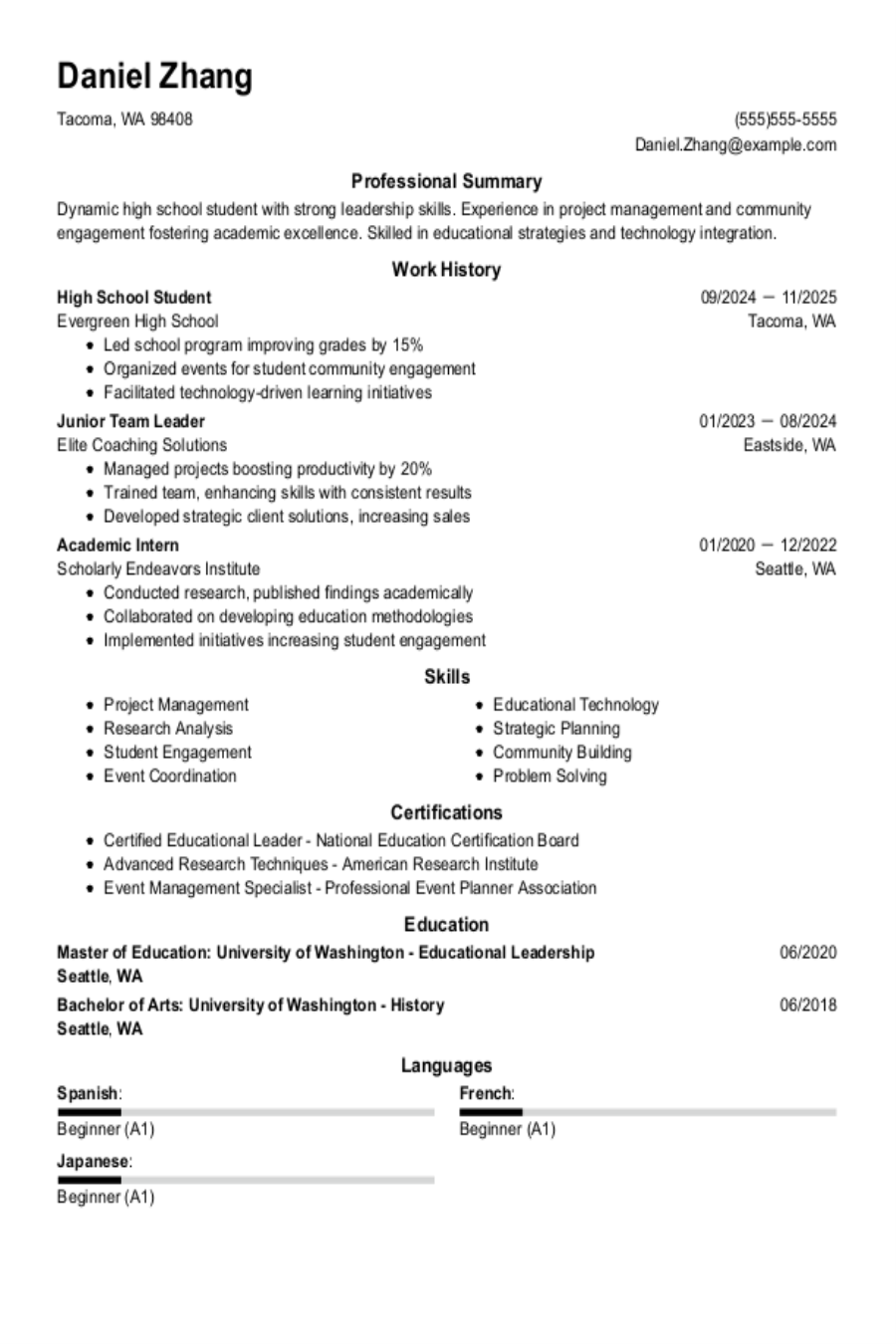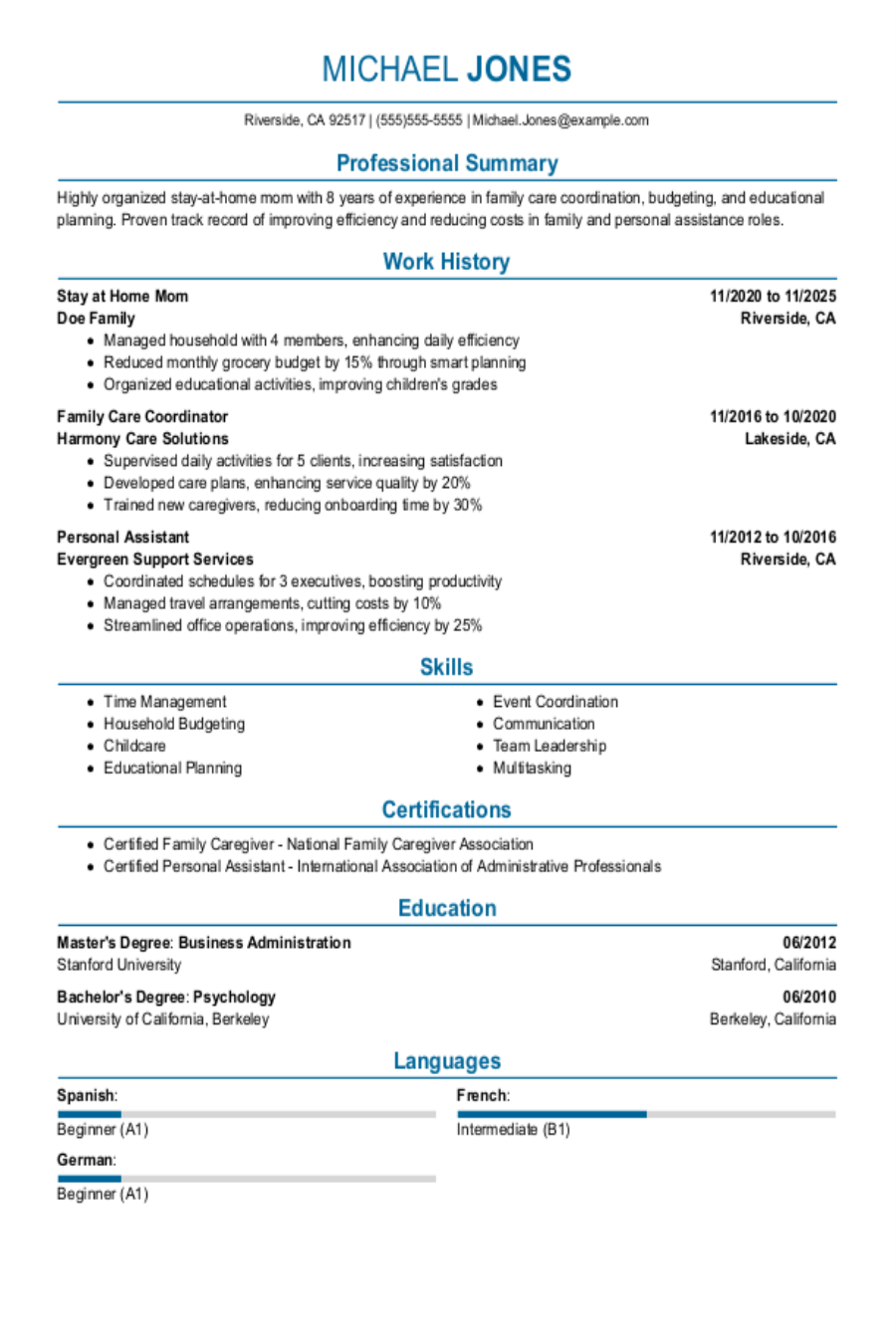Popular Psychology Resume Examples
Entry-level psychology resume
An entry-level resume for psychology should emphasize relevant coursework, volunteer experiences, internships, and skills like critical thinking, communication, and empathy to show potential contributions.
Showcases education: Highlighting education allows this resume to present the candidate as skilled and prepared, despite having limited hands-on experience.
Focuses on goals: The applicant demonstrates a strong commitment to professional growth in psychology, evidenced by diverse clinical experiences and a focus on improving patient outcomes through innovative therapy techniques.
Mid-career psychology resume
A mid-career psychology resume should emphasize a combination of practical experience, relevant skills, and ongoing professional development to effectively illustrate your growth and expertise in the field.
Begins with a powerful summary: This resume's strong professional summary highlights key qualifications, showcasing extensive experience in therapy and patient care. This allows recruiters and ATS to swiftly recognize the applicant's suitability for psychology roles.
Employs active language: Using action verbs such as "conducted," "developed," and "implemented" effectively highlights significant accomplishments and proactive measures taken in each role, showcasing a strong professional impact.
Experienced psychology resume
An experienced psychology resume should highlight key achievements and relevant skills, demonstrating a clear path of professional development in the field.
Embraces modern design: This modern resume template effectively showcases the job seeker's innovative approach to psychology, highlighting their extensive experience and commitment to improving client well-being through tailored therapeutic programs.
Optimized for ATS: The resume uses a professional template that seamlessly incorporates a clear header and an ATS-friendly resume design, ensuring easy navigation for hiring managers and automated systems alike.
No experience psychology resume
A resume for an applicant with no experience should emphasize relevant skills, academic achievements, and volunteer work to demonstrate the job seeker's potential and dedication to growth in the field of psychology.
Overcomes lacking experience: Incorporating volunteer experience and academic achievements showcases this applicant's foundational knowledge in psychological principles, effectively bridging the gap left by limited practical experience.
Favors clarity over complexity: The resume's straightforward layout allows qualifications to shine through, highlighting relevant experience in mental health awareness and community support.
More resume examples
Additional Guides
- Amazon
- Analyst
- Architecture
- Art
- Artist
- Arts
- Aviation
- Banking
- Billing
- Biology
- Biotech
- Budtender
- Business
- Business Operations
- Cashier
- Chef
- Chemical Engineering
- Chemistry
- Child Care
- Civil Engineering
- College
- College Graduate
- Communications
- Compliance
- Computer
- Computer Hardware
- Computer Science
- Computer Software
- Construction
- Consultant
- Cook
- Copywriting
- Cosmetology
- Culinary
- Customer Service
- Customer Success Manager
- Cyber Security
- Data Systems Administration
- Dentistry
- Driving
- ECommerce
- Education
- Electrical
- Electrical Engineering
- Engineering
- Entertainment
- Entry Level
- Environmental
- Esthetician
- Event Planning
- Executive
- Fashion
- Federal
- Film
- Finance
- Firefighter
- Fitness & Nutrition
- Food Service
- Government
- Graphic Designer
- Handyman
- Healthcare Support
- High School Student
- Hospitality
- Human Resources
- Industrial Engineering
- Insurance
- Interior Design
- Internship
- Inventory Management
- IT
- Janitorial
- Law
- Law Enforcement
- Legal
- Library Museum
- Logistics
- Maintenance
- Manager
- Marketing
- Mechanical Engineering
- Medical
- Mental Health
- Metal Work
- Military
- Music
- Nursing
- Performing Arts
- Pest Control
- Pharmacy Technician
- Photographer
- Physical Therapy
- Pilot
- Plumbing
- Product Manager
- Product Owner
- Production
- Production Assistant
- Program Manager
- Project Manager
- Purchasing
- Quality Control
- Radiologic Technologist
- Real Estate
- Restaurant Manager
- Retail
- Safety Security
- Sales
- Sales Associate
- Scholarship
- Sciences
- Server
- Shipping
- Skilled Trades
- Social Services
- Software Engineer
- Special Education
- Sports
- Statistics
- Stay At Home Mom
- Student
- Supervisor
- Teacher
- Teen
- Training Development
- Transportation
- Travel
- Ux Designer
- Veterinary
- Virtual Assistant
- Waitress
- Web Development
Psychology Resume Template
Looking for a way to showcase your skills? This psychology resume template serves as an excellent foundation that you can easily personalize with your unique details.
John Kim
Oakridge, OR 97466
(555)555-5555
John.Kim@example.com
Professional Summary
Licensed Clinical Psychologist with 6 years' experience in mental health services. Expertise in cognitive-behavioral therapy, patient counseling, and trauma-focused care. Proven success in reducing relapse rates by 10% and improving client satisfaction by 30%.
Work History
Psychologist
Mindful Health Solutions - Oakridge, OR
January 2023 - December 2025
- Designed therapy plans, achieving 85% patient improvement rate
- Conducted 100+ behavioral assessments annually for treatment plans
- Collaborated with 10+ therapists to enhance patient care delivery
Clinical Mental Health Consultant
Wellness Path Counseling - Oakridge, OR
January 2019 - December 2022
- Provided counseling to 120+ clients, improving client satisfaction scores by 30%
- Led mental health workshops, benefitting over 500 attendees annually
- Implemented data-driven methods, reducing patient relapse rates by 10%
Behavioral Therapy Associate
Bright Minds Psychology Center - Portland, OR
January 2017 - December 2018
- Assisted in 200+ therapy sessions, boosting program retention rates by 15%
- Developed training materials, improving internal staff knowledge by 20%
- Collaborated with cross-functional teams to improve patient outcomes
Skills
- Cognitive Behavioral Therapy
- Patient Counseling
- Mental Health Assessment
- Trauma Therapy
- Crisis Intervention
- Behavioral Analysis
- Psychometric Testing
- Mindfulness Techniques
Certifications
- Certified Clinical Psychologist - American Board of Professional Psychology
- Trauma-Informed Care Specialist - National Association of Counselors
- Advanced Cognitive Behavioral Therapy - Behavioral Health Institute
Education
Master's Degree Clinical Psychology
University of Chicago Chicago, Illinois
May 2016
Bachelor's Degree Psychology
University of Wisconsin-Madison Madison, Wisconsin
May 2014
Languages
- Spanish - Beginner (A1)
- French - Intermediate (B1)
- German - Beginner (A1)
Writing Your Psychology Resume
Having explored these compelling resume examples, you're now prepared to write your own. We will guide you step by step, ensuring you understand how to write a resume that stands out in the psychology field.
List your most relevant skills
A strong skills section on your psychology resume must highlight not only your technical expertise, such as knowledge of psychological assessment and therapy techniques, but also essential soft skills like empathy and communication.
To maximize your chances of passing both human recruiters' reviews and applicant tracking systems, incorporate keywords from the job listing into your skills section. This strategy shows that you understand the requirements of the position and positions you as a strong job seeker.
Example of skills on a psychology resume
- Proficient in applying psychological theories to real-world scenarios
- Adept at conducting assessments and interpreting results
- Compassionate communicator with a strong ability to build rapport
- Analytical thinker skilled in developing effective treatment plans
A strong skills section should highlight both hard and soft skills, demonstrating an applicant's capability to tackle technical tasks while effectively engaging with colleagues and clients. This balance showcases readiness for diverse workplace dynamics.
Highlight your work history
Your work experience section should demonstrate on your achievements and illustrate how you applied your skills in various settings. This section should detail not just what you did, but also highlight the impact of your contributions, ensuring that potential employers can see evidence of your capabilities.
When detailing each job entry, include essential information like your job title, the name of the employer, and the dates you were employed. Providing this clarity helps employers quickly assess your qualifications and establish trust in your professional background.
Example of a psychology work experience entry
- Psychologist
Mental Health Services - New York, NY
June 2019 - Present - Conduct over 15 psychological assessments weekly to evaluate clients' mental health needs and develop tailored treatment plans
- Facilitate individual and group therapy sessions, improving coping strategies and fostering personal growth, resulting in a 90% client retention rate
- Collaborate with multidisciplinary teams to provide comprehensive care, ensuring effective communication regarding client progress and treatment adjustments
- Implement evidence-based interventions that contribute to a measurable improvement in clients' well-being as reflected in follow-up surveys
- Mentor new interns on therapeutic techniques and ethical practices, promoting professional development and adherence to industry standards
Aim for clarity in your resume bullet points. Each point should highlight a specific achievement or skill, ensuring you provide enough context without overwhelming the reader with unnecessary details.
Include your education
The education section of your psychology resume should present your academic credentials in reverse-chronological order starting with your most recent degree. Include any relevant degrees, diplomas, and certifications while omitting your high school diploma if you have a higher educational qualification.
If you are currently pursuing a degree or have incomplete education, specify your highest completed level and indicate an expected graduation date. Including bullet points that detail relevant coursework or academic achievements can be beneficial especially for current students or recent graduates as it emphasizes your educational background.
Common certifications for a psychology resume
- Licensed Professional Counselor (LPC) – National Board for Certified Counselors (NBCC)
- Board Certified Behavior Analyst (BCBA) – Behavior Analyst Certification Board (BACB)
- Clinical Psychologist License – American Psychological Association (APA)
- Certified School Psychologist – National Association of School Psychologists (NASP)
Showcase publications and research
In the field of psychology, including a publications section on your resume is important for demonstrating your expertise and commitment to advancing knowledge. Publications serve as evidence of your research capabilities, critical thinking, and contributions to the discipline. They reflect not only your mastery of psychological theories and practices but also your ability to engage with complex topics that are important in this continually evolving field.
You should create a dedicated publications section if you have several significant works to highlight. This allows you to draw attention to your scholarly contributions without cluttering other sections. However, if you have just one or two notable publications, consider integrating them within the education or experience sections to maintain a clean layout while still showcasing these important credentials.
Example of a publications section
- Smith, J. & Doe, R. (2024). "Cognitive Behavioral Therapy: Techniques and Applications". Journal of Psychology Research, 20(1), 15-30.
- Johnson, A., Lee, T., & Brown, M. (2023). "Understanding Anxiety Disorders: A Review". Clinical Psychology Journal, 10(4), 45-60.
- Research Contributor, Child Psychology Initiative (2022–2023). "Research Contribution: Improving Child Development Outcomes". Participated in a study analyzing the impact of parental involvement on child behavior..
- Chen, H., Johnson, A., et al. (2022). "Collaborative Approaches to Mental Health Treatment". International Journal of Mental Health, 15(3), 200-215.
Sum up your resume with an introduction
A well-crafted profile is your chance to make a strong first impression on potential employers. It serves as an introduction to your qualifications and sets the tone for the rest of your resume.
For experienced applicants, a professional summary is particularly effective. It allows you to showcase key achievements and relevant experience right at the top of your resume. If you haven’t built up much experience yet, add a resume objective that speaks to your passion for career growth.
Professional summary example
Insightful psychologist with over 10 years of experience in clinical settings, adept at delivering exceptional patient care and facilitating transformative therapeutic experiences. Demonstrated expertise in cognitive-behavioral therapy, psychological assessments, and developing personalized treatment plans that improve mental well-being. Committed to fostering a supportive environment that promotes resilience and growth.
Resume objective example
Enthusiastic psychology graduate eager to apply strong analytical, communication, and interpersonal skills in a collaborative environment. Aiming to support mental health initiatives and contribute positively to team objectives while fostering a compassionate approach to client care.
When writing your resume profile, start with your job title to effectively communicate your professional identity. Whether you choose a professional summary or an objective statement, beginning this way helps employers quickly understand who you are and what you bring to the table.
Add unique sections to set you apart
Improve your resume by including optional sections that highlight your unique qualifications for psychology positions. These sections allow you to showcase skills and experiences that set you apart from other job seekers.
Consider adding details about relevant hobbies or volunteer work that align with your values in this field. This not only demonstrates your passion for psychology but also reveals important soft skills such as empathy and communication. Employers appreciate seeing how you engage with the community or develop skills outside of traditional roles, giving them a fuller picture of who you are as a job seeker.
Three sections perfect for a psychology resume
- Clinical experience: Your clinical training highlights your practical skills and understanding of psychological principles. Mention internships, practicum placements, or volunteer work where you applied psychological theories in real-world settings.
- Publications and presentations: Publishing research or presenting at conferences establishes your expertise and thought leadership. Include any articles, papers, or talks that you've contributed to, specifying the audience and significance.
- Continuing education: Ongoing learning reflects your dedication to staying current in the field. List workshops, certifications, or courses that improve your knowledge and skills relevant to psychology.
5 Resume Formatting Tips
- Choose a format that matches your career stage.
Choosing the appropriate resume format is important for presenting your experience. A chronological format effectively highlights career progression for those seasoned in psychology. If you're just starting out, a functional format places emphasis on skills rather than experience. To highlight both your skills and work history, consider using a combination resume.
- Pick a smart resume template.
Using a professional resume template improves readability and ensures your key information stands out. A well-structured format helps hiring managers easily skim through your qualifications. If you prefer a custom design, keep it clean with eye-friendly, ATS-compliant fonts.
- Select an appropriate font.
Choose a professional font to improve your resume's readability. Using fonts like Helvetica, Georgia, or Verdana ensures that your qualifications stand out to both recruiters and applicant tracking systems, as they are clean and easy on the eyes.
- Use consistent formatting.
Ensure your resume is formatted with uniform margins and left alignment to improve readability and present a polished, professional image.
- Keep your resume to one or two pages.
When outlining your resume, remember that resumes should be one page long unless you have extensive experience. Focus on including only the most relevant information to ensure clarity and impact.
What’s the Average Psychology Salary?
Psychology salaries vary based on location, career level, and qualifications.
This data, provided by the Bureau of Labor Statistics, will show you expected salary ranges for psychologys in the top 5 highest-paying states, including the District of Columbia. The figures reflect the most current salary data available, collected in 2024.
- Full Range
- Most Common (25th–75th percentile)
- Average
California
Most common: $76,740 - $160,900
Maryland
Most common: $65,730 - $128,190
New York
Most common: $77,130 - $130,890
Oregon
Most common: $76,590 - $128,420
North Dakota
Most common: $83,370 - $127,860
Tools for Your Job Search
Are you preparing to apply for positions in the field of psychology? Before submitting your application, consider using our ATS Resume Checker. This essential tool provides insights into how well your resume aligns with the automated systems that many organizations use for initial applicant screenings.
Looking to improve your application further? Our AI Resume Builder offers tailored recommendations specific to your psychology background, along with professional templates designed to showcase your skills and experiences effectively. This means you can present yourself confidently to hiring managers.
Frequently Asked Questions
Last Updated: December 12, 2025
Absolutely. A cover letter is important as it adds depth to your resume and provides an opportunity to communicate directly with employers. It allows you to express your enthusiasm for the role and explain how your background makes you a perfect fit. So, don’t hesitate—write a cover letter that improves your application.
For those short on time, our AI Cover Letter Generator offers a quick solution for crafting personalized letters. You can select from various cover letter template options that align perfectly with your resume, making your application stand out effortlessly.
A CV (curriculum vitae) is generally more extensive and detailed than a resume. While resumes are typically one to two pages long, CVs can stretch over several pages, offering an in-depth look at your academic history, research contributions, publications, and comprehensive professional experiences. To streamline the creation of such detailed documents, consider using an online CV Maker.
You should use a CV for positions in academia, science, law, or medicine where detailed credentials matter. If you're uncertain about your document format, our online tools simplify the process. You can quickly create a tailored CV using various CV templates designed for different industries and career stages—helping you make a strong impression effortlessly.
To write a strong CV, begin by structuring it with clear sections such as education, professional experience, and key skills. Opt for a simple template that is visually appealing yet ATS-compatible. Tailor your CV for each job application by incorporating relevant keywords from the job description.
For additional guidance, examine CV examples created by professionals within your field. This approach will give you insight into effectively showcasing your achievements and making an impression on potential employers.
Choosing the right resume format is important for showcasing your strengths effectively. Inexperienced job seekers may find the functional format beneficial, as it highlights skills over experience. Conversely, seasoned professionals should opt for the chronological format, which brings their work history to the forefront. Mid-level applicants might consider the combination format, offering a balanced view that showcases both relevant skills and professional experience to attract potential employers.
To ace your interview, practice answering common job interview questions and answers. This preparation not only boosts your confidence but also equips you to handle any surprises that may come your way.
Many psychology professionals start as research assistants or counselors. By pursuing advanced degrees and certifications, they can advance to clinical psychologists, researchers, or educators in the field of psychology.
Was this information helpful? Let us know!
Hailey is a career advice writer dedicated to helping job seekers excel in their careers.
More resources

How to List Excel Skills on Your Resume (40+ Examples, Definition & Tips to Improve)
Learn how to list Excel skills on your resume with our guide f...

What If No One Responds When You Try To Follow Up After a Job Interview?
If no one responds after you try to follow up after a job inte...

How to List Adaptability Skills on Your Resume (35+ Examples, Definition & Tips to Improve)
Our adaptability skills definition and guide will help you wri...

Student Resume: 2025 Examples & Templates
Check out our guide for help writing a job-winning student res...

Teen Resume: Examples, Template & Advice for Beginners
Whether you re looking for an internship or your first job a ...


